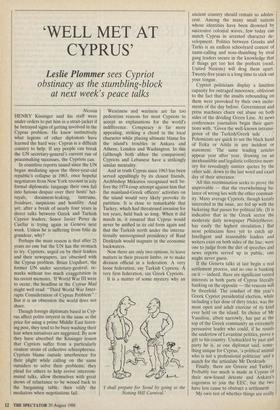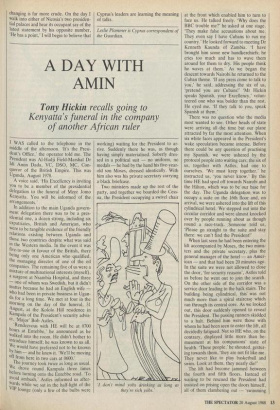`WELL MET AT CYPRUS'
Leslie Plommer sees Cypriot
obstinacy as the stumbling-block at next week's peace talks
Nicosia HENRY Kissinger said his staff were under orders to put him in a strait-jacket if he betrayed signs of getting involved in the Cyprus problem. He knew instinctively what legions of other diplomats have learned the hard way: Cyprus is a difficult country to help. If any people can break the UN secretary-general's current run of peacemaking successes, the Cypriots can.
In countless reports issued since the UN began mediating upon the three-year-old republic's collapse in 1963, once hopeful negotiators from New York recount in icily formal diplomatic language their own fall into furious despair over their hosts' bet- rayals, document-leaking, tantrums, froideurs, suspicions and hostility. And yet, after a break of nearly four years in direct talks between Greek and Turkish Cypriot leaders, Senor Javier Perez de Cuellar is trying again in Geneva next week. Unless he is suffering from folie de grandeur, why?
Perhaps the main reason is that after 25 years no one but the UN has the stomach to try. Cypriots, urged on by their leaders and their newspapers, are obsesked with the Cyprus problem. Brian Urquhart, the former UN under secretary-general, re- marks without too much exaggeration in his recent memoirs, 'If World War III were to occur, the headline in the Cyprus Mail might well read: "Third World War Inter- rupts Consideration of Cyprus Problem".' But it is an obsession the world does not share.
Though foreign diplomats based in Cyp- rus affect polite interest in the issue as the price for using a prime Middle East listen- ing post, they tend to be busy washing their hair when initiatives are suggested. By now they have absorbed the Kissinger lesson that Cypriots suffer from a particularly virulent strain of collective schizophrenia. Cypriots blame outside interference for their plight while calling on the same outsiders to solve their problems; they plead for others to help revive intercom- munal talks, allow themselves with great shows of reluctance to be wooed back to the bargaining table, then vilify the mediators when negotiations fail. Weariness and wariness are far too pedestrian reasons for most Cypriots to accept as explanations for the world's indifference. Conspiracy is far more appealing, striking a chord in the local character while placing ultimate blame for the island's troubles in Ankara and Athens, London and Washington. In this (although both abhor the comparison) Cypriots and Lebanese have a strikingly similar mentality.
And in truth Cyprus since 1963 has been served appallingly by its closest friends, Archbishop Makarios recognised well be- fore the 1974 coup attempt against him that the mainland-Greek officers' activities on the island would very likely provoke its partition. It is close to remarkable that Turkey, which had threatened invasion for ten years, held back so long. When it did march in, it ensured that Cyprus would never be unified in its old form again and that the Turkish north under the interna- tionally unrecognised presidency of Rauf Denktash would stagnate in the economic backwaters.
Now there are only two options, to leave matters in their present limbo, or to make division official in a federation. A very loose federation, say Turkish Cypriots. A very firm federation, say Greek Cypriots.
It is a matter of some mystery why an 'I shall prepare for Seoul by going to the Notting Hill Carnival.' ancient country should remain so adoles- cent. Among the many small nations whose identities have been drowned by successive colonial waves, few today can match Cyprus in arrested character de- velopment. Politics between Greeks and Turks is an endless schoolyard contest of name-calling and nose-thumbing by rival gang leaders secure in the knowledge that if things get too hot the prefects (read, United Nations) will drag them apart. Twenty-five years is a long time to stick out your tongue.
Cypriot politicians display a limitless capacity for outraged innocence, oblivious to the fact that the insults rebounding on them were provoked by their own incite- ments of the day before. Government and press machines churn out abuse on both sides of the dividing Green Line. At news conferences journalists begin their ques- tions with, 'Given the well-known intransi- gence of the Turkish/Greek side . . . Polemicists are quick to see the black hand of Eoka or Attila in any incident or statement. The same leading articles appear year after year, drawing on an inexhaustible and legalistic collective mem- ory for revealingly sinister quotes by the other side, down to the last word and exact day of their utterance.
All this recrimination seeks to prove the unprovable — that the overwhelming ba- lance of wrong lies with the other commun- ity. Many average Cypriots, though keenly interested in the issue, are fed up with the bickering that passes for political life. (It is indicative that in the Greek sector the moderate daily newspaper Phileleftheros, has easily the highest circulation.) But most politicians have yet to catch up. Intelligent and reasonable leaders and writers exist on both sides of the line; were one to judge from the diet of speeches and news reports served up in public, one might never guess.
If the Geneva talks at last begin a real settlement process, and no one is banking on it — indeed, there are significant vested interests in both parts of Cyprus literally banking on the opposite — the reasons will be threefold. The conduct of this year's Greek Cypriot presidential election, while including a fair dose of dirty tricks, was the most open and adult exercise of its kind ever held on the island. Its choice of Mr Vassiliou, albeit narrowly, has put at the top of the Greek community an extremely persuasive leader who could, if he resists the undertow of Levantine politics, prove a gift to his country. Unshackled by past and party he is, as one diplomat said, some- thing unique for Cyprus, 'a political animal who is not a professional politician' and a match for the articulate Mr Denktash.
Finally, there are Greece and Turkey. Probably too much is made in Cyprus of their new-found détente and Ankara's eagerness to join the EEC, but the two have less cause to obstruct a settlement.
My own test of whether things are really changing is far more crude. On the day I walk into either of Nicosia's two presiden- tial palaces and hear its occupant say of the latest statement by his opposite number, 'He has a point,' I will begin to believe that Cyprus's leaders are learning the meaning of talks.
Leslie Plommer is Cyprus correspondent of the Guardian.























































 Previous page
Previous page